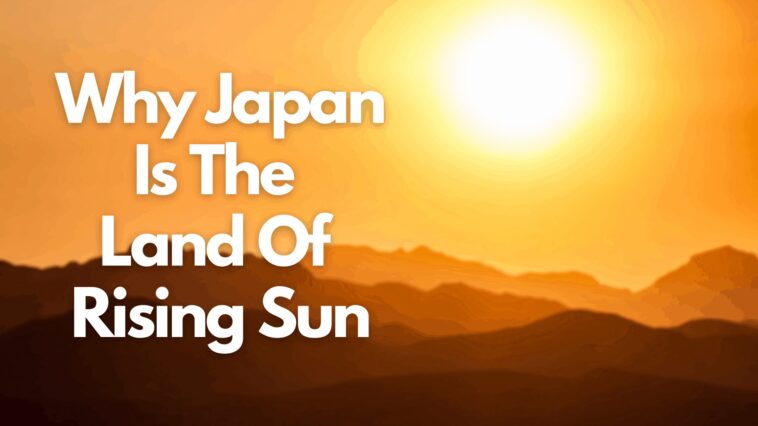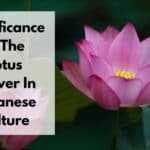Did you know Japan is called the land of rising sun? Read on to find out why Japan is the land of rising sun?
Japan’s nickname, “The Land of the Rising Sun,” isn’t just a pretty picture. Explore the reasons behind this moniker, from its geographical location to its deep connection to the sun in Japanese mythology and culture.

Why Japan is the Land of Rising Sun?
As per Kanji, the word Nihon literally means ‘origin of the sun’. When translated in English, Nihon means the ‘land of the rising sun’. This is actually a reference to the fact that Japan lies on the east side of China and due to this, it appeared that Japan is right in the place from where the sun rose. This fact is quite synonymous with the origin story of Japan. The sun goddess Amaterasu holds a very important place in the mythological side of Japan.
When we talk about all the hallmarks of the world, it is ancient China that developed all of it.

It is known to be behind all the written language, advanced cities, labor, bronze technology, and others. All of this was done and achieved by ancient China at least 2000 years before Japan.
It is because of all of this that China had a gigantic influence on the younger culture. The nation has shared so much, including philosophies, political structures, architecture.
Not just that, China has also shared Buddhism, clothing styles, and its written language as well.
In fact, if we look at the earliest known written work about Japan, we can see that it was mentioned in a Chinese book.
China has a pretty powerful influence, and this influence can be seen when it comes to Japan as well. The earliest description of Japan and its development was all done from a Chinese perspective.
And the geographical location of Japan is such that when the Chinese looked towards it, they looked towards the direction that brought dawn to the world, i.e., that side that brought the sun.
- Related: Why is Japan so advanced
Earliest History of Japan
When the first Japanese ambassador visited China for the first time, China was still known by its old name, Wa(Wo). This was in 57 AD when the Japanese ambassador visited the Chinese Han eastern capital.
The name Wa(Wo) did not only apply to the nation; the people of Japan were also known by this name. If we go through the contemporary Chinese accounts, we get to learn a lot about Japan in the earliest days.
From these accounts, we can see that the people in Japan mainly survived on raw vegetables, rice, and fish. These were the main source of food for the Japanese. The people also had vassal-master relations, collected tax, had provincial granaries and markets. We can also see a lot of violent succession struggles in Japan in its earliest days.
In the first century AD, there was one clan that began to dominate and rule over all its neighbors. It was known as the Yamato clan. The clan got so powerful that by the 5th century AD, the word Yamato became the synonym for Japan.
During that time, Japan followed everything Chinese, right from its culture to its methods of administration. This happened due to the emergence of a central government.
- Related: is Japan Humid
- Related: Why Is Japan called Japan
- Related: List of Japanese Historical Periods
And then came 600 AD, which was the time of Shotoku, the Prince Regent of Japan. He was a big fan of China and its culture and so, he introduced quite a huge number of Chinese influences to Japan.
Under Shotoku, a lot of changes happened in Japan and it was flooded with a lot of Chinese influence. Under his regime, Japan followed and adopted the Confucian models of rank and etiquette. And not only that, during this time, Japan also adopted the Chinese calendar.
It was also under Shotoku’s regime that a system of highways was developed in Japan. There also came to be a number of Buddhist temples. Shotoku also sent Japanese students to China to study Buddhism and Confucianism.
He also had court chronicles combined and ensured that formal diplomatic relations with China were established.
And apart from all these changes and additions made, Shotoku is also known to have coined the name, Nippon. The name means ‘Sun Origin’ and is what Japan is still known as.
The mention of ‘Sun Origin’ was first done by Prince Shotoku when he first sent a letter to the Sui Emperor, Yangdi.
This letter was written at the time of the first embassy to the Sui dynasty. In the letter, Prince Shotoku wrote, ‘from the Son of Heaven in the land where the Sun rises to the Son of Heaven in the land where the sun sets’.
Despite all of this, in 645 AD, a great change took place after a palace coup. The new reform was intended to further centralize the government. It also eliminated private ownership of lands and put them under the control of the centralized government.
According to this reform, the names Nippon, Nihon (with both having the same meaning, the origin of the sun), and Dai Nippon were used “in diplomatic documents and chronicles” in place of Wa(Wo).
However, this change of name was not well received and well recorded in the Chinese records. If we look at the Chinese accounts, we can see a variation. In the Chinese accounts, the name Nippon only appears in the 7th century.
Related: Stay connected with your friends and family back home. Here’s how to get a tourist Japan SIM card!
When we look at one of the Twenty-Four Histories, it stated that the Japanese envoy disliked the country’s name and so changed it to Nippon, or the ‘Origin of the Sun’.
However, another record of the 8th century mentions that the Chinese Empress Wue Zetian ordered a Japanese envoy to change the name of the country to Nippon.
Different Chinese accounts have different histories behind the renaming of the name to Nippon. If we look at the words of the Japanese envoy, the name ‘Nippon’ was chosen because the country was close to where the sun rises.
No matter how the name came into being, it stuck around, and for the past 1400 years, Japan has been referred to by the world as Nippon, or the land of the rising sun.
- Related: Why is Japan’s Population Decreasing
How did Japan earn the title of being the ‘land of the rising sun’?
Japan was renamed Nihon from Wakoku, and as per the Japanese envoy, the name was chosen with a very specific reason in mind. The name ‘Nihon’ was chosen because Japan lies so close to where the sun rises. It is because of this reason that for the past 1500 years, the world has known Japan as Nihon or Nippon – the land of the rising sun.
Why does sunrise happen so early in Japan?
Japan is a country that lies on the east side, which means that everything here happens earlier than on the countries that lie on the west side.

- Related: Is Japan a Socialist Country
Why is the rising sun so important to Japan and the Japanese?
Japan is known as the land of the rising sun, and this notation has a very significant meaning to the country and the Japanese. You can see the design of the Rising Sun Flag in several scenes in the daily lives of the Japanese people.
You can see this design in the banners displayed by the fishermen when they get lucky with a large catch of fish, the flags hoisted during childbirth, or when there are seasonal festivals.
The symbol of the rising sun is also used in commercial products and by Japanese brands. It is also used by Japanese and non-Japanese supporters in sporting events.
- Related: Why is Japan Prone to Earthquakes
What does the sun symbolize in Japan?
The sun is an iconic Japanese symbol. This has been derived from the mythological goddess of the sun, Amaterasu. The feudal warlords adopted a design known as the ‘Rising Sun Flag’. This is a symbol that is still used in Japan as a symbol of tradition and good fortune.
Japan, the land of the rising sun!
Japan, a country that is known for a number of things worldwide, has a history that is etched in all ancient documents and records. The country has seen a significant change in what it’s called. The name of the nation has changed over the course of history, and I hope this guide helped you uncover all of that. In this guide, I have put together the rich history of the nation and how it came to be known as the land of the rising sun!
Japan Is The Land Of The Rising Sun: FAQs
Why Japan is called as land of Rising Sun?
Japan is called the land of the rising sun because in China when the sun rises, it looks like it rising from the direction of Japan. Also, the in Japanese, the country is referred to as ‘Nihon’ or ‘Nippon’, which literally translates to ‘source of the sun’. And in English, it’s lossely translated to land of the rising sun
Why is Japan called Nippon?
Nippon also known as Nihon, literally translates to ‘the sun’s origin’. In English, it is loosely translated to Land of the Rising Sun. This name for Japan was originated during a correspondence with the Chinese Sui Dynasty. The Chinese always referred Japan as the city where the sun rises.
Also Read
- Why is Japan Considered Safe
- How to Differentiate between Japanese, Korean and Chinese
- All About Japan’s Democracy and Governing System





